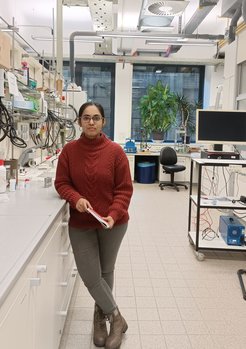Minerva’s Daughters step out of the shadows
Teja Yanamandram from India works as PhD candidate at the institute.
Teja Yanamandram loves science and teaching young people. She has been working at our institute since 2023. The young Indian found her way to the Max Planck Society via the IMPRS program.

Teja Yanamandram works as a PhD student in the group of Prof. Dr. Claudia Weidenthaler. She has been working at our institute since 2023. The young Indian found her way to the Max Planck Society via the IMPRS program.
What brought you here? Tell us about your way to the Kohlenforschung!
Teja Yanamandram: I finished my Masters degree at Jain University in 2018. After that, I was working as a Research Fellow for two years. After a while, I decided to begin my PhD at an institution in South Korea. To be honest, I was not happy there due to certain circumstances that I did not have any chance to change. Thus, due to the disagreeable working conditions in this special position I quit the PhD and returned to India for a while. Then I discovered the IMPRS program. I had heard of Max Planck before, but via the IMPRS I learned about the Kohlenforschung and I applied for another PhD. I am very happy that I was accepted.
What do you like about your work?
Teja: I love working with all the machines in our department. Moreover, it is very convenient that here at the institute I have access to all the facilities that I require for my research. About scientific work itself, I love that each day brings new challenges. We have a long list of things we want to solve. Instead of checking of the things, each day we add new things to this list. Anyway, it makes me happy because every day I am learning something new.
What are your professional goals?
Teja: I want to continue my career in academia. Conducting research and teaching younger generations are my main goals. I often think about my supervisors – the good ones and the less good ones. I want to follow their examples – or I want to do better than them. What I like about teaching students is the fact that you, as a teacher, have to learn more day by day; otherwise you will not be able to teach the younger generations properly. Finally, especially in countries like India, I strongly believe that we need more people in research. So teaching the young ones is essential for the future of our society.
What has been your most difficult step so far?
Teja: For me it was a very tough decision to go back to India after what I have experienced in South Korea. I clearly could not stay there, but I was afraid that I had made mistakes. Nevertheless, after a while I learned that those things that happened to me were not my mistake. Yes, they happened to me, but they were not my fault. My family was, as always, very supportive at that time.
Do you have a role model?
Teja: Yes, I have several! First, there is my mother. She is a single mum and a Mathematics Teacher. She really pushed me into science. Then there is my Masters Supervisor Dr. N. Shanthi and my current PhD supervisor Prof. Dr. Claudia Weidenthaler, two very impressive women. Another scientist that I really admire is biochemist Kamala Sohonie. Despite extremely adverse circumstances, she was the first woman in India to gain a doctorate in natural sciences. History does not give women in science the credit they deserve!
What advice would you give to young girls who are interested in working in a scientific institution?
Teja: If you want to pursue a career in science, be confident about yourself. Do not be afraid to stand alone and apart. Many girls are taught to be nice and well behaved, but this should not mean you have to fade into the background of men.
If you had one wish: What would it be?
Teja: I have many wishes (laughs). However, if I have to choose one, I would wish for a society without patriarchy where our brains count, not our bodies. Everyone should be treated equally, no matter what gender or sexual orientation.












